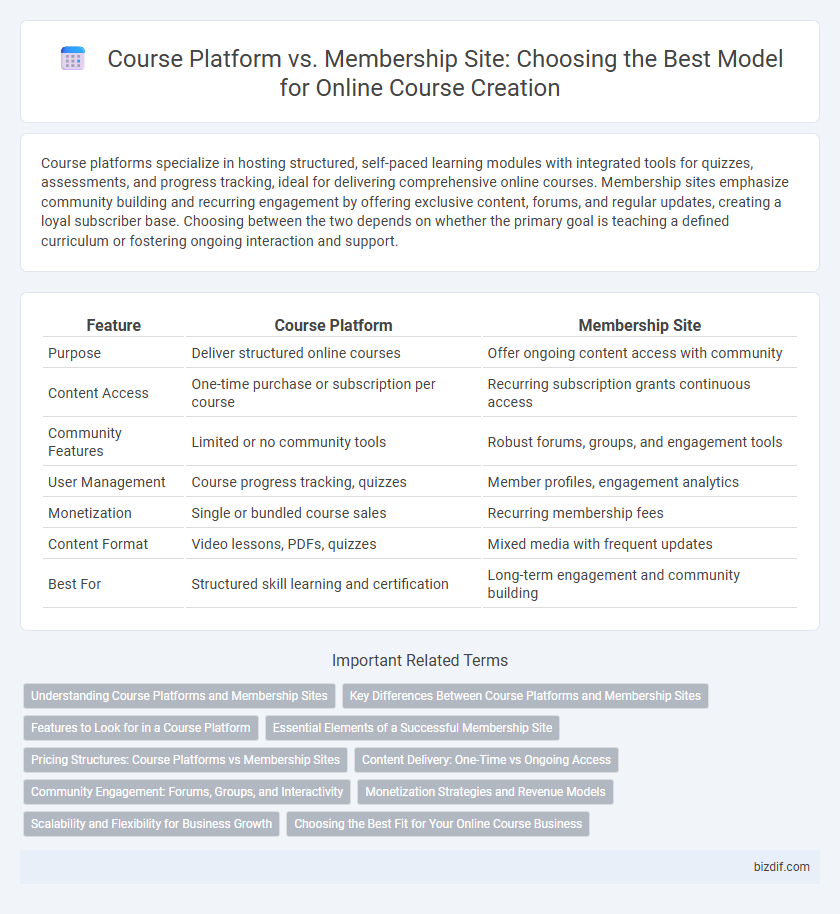Course platforms specialize in hosting structured, self-paced learning modules with integrated tools for quizzes, assessments, and progress tracking, ideal for delivering comprehensive online courses. Membership sites emphasize community building and recurring engagement by offering exclusive content, forums, and regular updates, creating a loyal subscriber base. Choosing between the two depends on whether the primary goal is teaching a defined curriculum or fostering ongoing interaction and support.
Table of Comparison
| Feature | Course Platform | Membership Site |
|---|---|---|
| Purpose | Deliver structured online courses | Offer ongoing content access with community |
| Content Access | One-time purchase or subscription per course | Recurring subscription grants continuous access |
| Community Features | Limited or no community tools | Robust forums, groups, and engagement tools |
| User Management | Course progress tracking, quizzes | Member profiles, engagement analytics |
| Monetization | Single or bundled course sales | Recurring membership fees |
| Content Format | Video lessons, PDFs, quizzes | Mixed media with frequent updates |
| Best For | Structured skill learning and certification | Long-term engagement and community building |
Understanding Course Platforms and Membership Sites
Course platforms specialize in delivering structured online courses with features like quizzes, progress tracking, and certificates, providing a streamlined learning experience. Membership sites offer ongoing access to exclusive content, community interaction, and recurring updates, fostering continuous engagement and retention. Understanding these differences helps creators choose tools that align with goals for content delivery and audience development.
Key Differences Between Course Platforms and Membership Sites
Course platforms specialize in delivering structured educational content with features like quizzes, progress tracking, and certifications, ensuring an optimal learning experience for students. Membership sites prioritize community engagement and ongoing access to exclusive content, fostering member retention through forums, live events, and resource libraries. The key differences lie in course platforms emphasizing curriculum delivery and assessment, while membership sites focus on building a loyal community with recurring value.
Features to Look for in a Course Platform
A course platform should offer essential features such as customizable course templates, integrated payment processing, and robust analytics for tracking learner progress and engagement. Membership site capabilities like gated content access, recurring subscription management, and community-building tools enhance learner retention and foster a sense of belonging. Prioritizing mobile responsiveness, seamless integrations with email marketing, and secure user authentication ensures a smooth and secure learning experience.
Essential Elements of a Successful Membership Site
A successful membership site hinges on essential elements such as exclusive content access, seamless user experience, and recurring billing integration to ensure steady revenue. Personalized member engagement tools and community-building features foster loyalty and active participation, setting membership sites apart from typical course platforms. Robust analytics and scalable infrastructure empower creators to continually optimize offerings and grow their membership base effectively.
Pricing Structures: Course Platforms vs Membership Sites
Course platforms typically charge a one-time fee or tiered pricing based on course quantity and features, offering straightforward costs for individual course creation. Membership sites use subscription-based models, generating recurring revenue through monthly or yearly fees that provide continuous access to evolving content and community features. Understanding these pricing structures helps creators choose platforms aligned with their revenue goals and audience engagement strategies.
Content Delivery: One-Time vs Ongoing Access
Course platforms typically offer one-time access to content, providing learners with a structured and complete curriculum available upon purchase. Membership sites emphasize ongoing access, delivering continuous content updates, exclusive resources, and community engagement to sustain learner involvement over time. Choosing between these depends on whether the educational strategy prioritizes a fixed learning path or long-term, evolving engagement.
Community Engagement: Forums, Groups, and Interactivity
Course platforms typically offer structured forums and discussion boards that facilitate student-to-student interaction and enable instructors to moderate conversations effectively. Membership sites often provide more dynamic community engagement through exclusive groups, live chats, and interactive events that foster deeper member connections and ongoing participation. Both options enhance learning experiences but differ in the level of interactivity and community-building features available.
Monetization Strategies and Revenue Models
Course platforms typically offer one-time purchase or installment payment models, maximizing upfront revenue through individual course sales, while membership sites emphasize recurring subscription fees, ensuring steady, predictable monthly income. Membership sites often leverage tiered access and exclusive content to increase customer lifetime value, whereas course platforms may focus on high-ticket course launches and upselling additional resources. Selecting between these models depends on targeting either immediate revenue boosts or sustainable, long-term engagement-driven cash flow.
Scalability and Flexibility for Business Growth
Course platforms offer streamlined scalability with built-in features for enrollment, content delivery, and progress tracking, making them ideal for businesses aiming to expand without managing complex infrastructure. Membership sites provide greater flexibility by allowing customization of user experience, payment models, and community engagement, supporting diverse growth strategies and sustained customer retention. Choosing between the two depends on whether a business prioritizes rapid, automated scaling or tailored, long-term member relationships to drive growth.
Choosing the Best Fit for Your Online Course Business
Course platforms offer structured tools and integrations specifically designed for creating, marketing, and selling online courses, making them ideal for educators focusing solely on content delivery and scalability. Membership sites provide a community-centric model with recurring revenue potential by fostering ongoing engagement and exclusive content access, suited for creators aiming to build long-term relationships. Assess your business goals, audience preferences, and desired revenue model to choose between the course platform's streamlined course management or the membership site's continuous interaction framework.
Course platform vs Membership site Infographic

 bizdif.com
bizdif.com